Once you see a living wall, chances are, you’ll want one.
These impressive vertical gardens turn blank walls into colorful, creative works of art — created from vibrant, living plants.
Here at Greenscape Inc., we’re known for our innovative living walls, and we love to keep outdoing our own creativity with each new installation.
What is a living wall? How do living walls work? And, the question everybody wonders: How much do living walls cost?
We have the expert with all the answers. Leslie Herndon, vice president of operations at Greenscpe, Inc. and the designer of our living walls, takes us behind the scenes.
So, What Is A Living Wall?
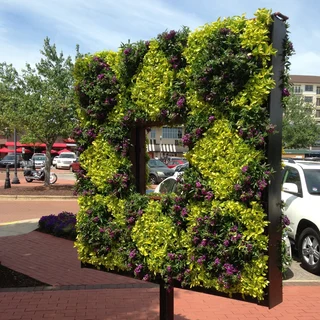
How Do Living Walls Work?
The structural panels are affixed to the wall with sturdy brackets. The plants are planted in small cells, then watered and maintained as any potted plant. They typically last for six months before either being changed for the season with new plants or taken down.
Why Invest In A Living Wall?
Nothing attracts attention like this unique artistry, created from stunning living plants. They’re unlike anything else, so they automatically add interest and excitement to a commercial property, drawing visitors to your site.
At Cameron Village retail center, home to several Greenscape living walls, people wander and browse the 500,000 square foot site to see the creative living walls, look forward to the next season’s designs and even pose with them for selfies. It’s landscaping as marketing.
“People say the living walls are their favorite thing here,” Herndon says. “People like to touch them. They can’t wait to see what new ones we put in each year.” Add them as living artwork to a blank wall, or we can create freestanding pieces for instant appeal anywhere on your property.
How Much Do Living Walls Cost?
Each living wall is custom designed, based on the available space and location of the wall where it will be placed. The initial cost to install the wall ranges from $500 to $2,000, Herndon says, and that price does not include the plants.
Once you have the initial panel system installed, the cost per panel in the summer is between $280 and $350 for a typical 20 x 20-inch panel, depending on the plants used and the intricacy of the design.
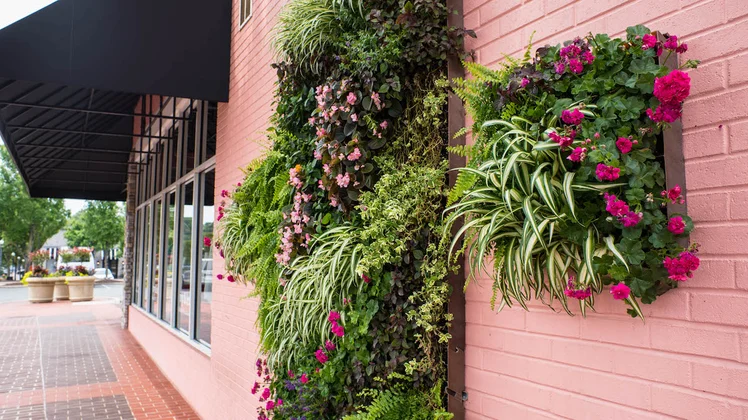
“Winter panels are more expensive than summer panels, because of the cost of the plants,” Herndon says. “We use more perennials for winter panels, and they’re more expensive than the annuals we use in the summer.”
Expect to pay between $375 and $415 per panel in the winter, she says.
While summer season living walls are typically planted with annuals, including begonias, lantana, angelonia, herbs and trailing vinca, winter panels are planted with hardier perennials. And these perennials, from mondo grass to sedges to sedums, cost more.
How Many Plants Are In A Wall?
A typical 20 x 20-inch panel includes 45 cells. Each cell holds a plant, so there are 45 plants in each panel.
But sometimes, depending on the design and the plants, there are two plants in a cell. That’s 90 plants in one panel.
The Work Behind The Cost
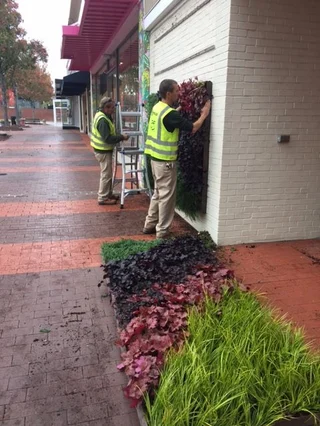
There’s more to planning and installing these living walls than meets the eye, Herndon says.
First, the supporting brackets are securely installed on the wall with several screws, and each bracket has to be leveled.
“It’s like putting up cabinets at your house,” Herndon says. “Everything has to be level, squared off, and straight.
“Exterior walls on commercial buildings aren’t always necessarily even,” she notes. “You might not be able to tell with the naked eye, but when you’re trying to install brackets perfectly straight, you can tell.”
Crews measure to exact centimeters, she says.
“It’s like carpentry or metal work,” Herndon says. “Everything is very precise. It fits together like a puzzle, and you don’t want big gaps showing between panels when you’re done.”
It takes a crew of six to eight an entire week to install the intricate walls, Herndon says, with multiple trips up and down ladders, screwing in brackets, affixing irrigation components and precisely installing plants according to the painstaking design.
How Long Do Living Walls Last?
The panels will need replacing every six months, Herndon says. They can either be switched out for new panels of fresh plants for the season, or taken down.
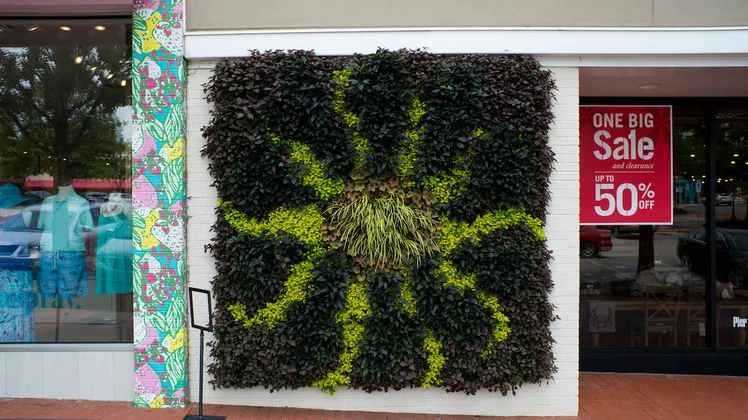
How Are Living Walls Watered?
Each living wall panel is fitted with a modified drip irrigation system that flows from the top of the panel down, with “a zillion emitters,” Herndon says, so each plant gets plenty of water.
The small irrigation hoses are fitted tightly along the panels and affixed with zip ties so they stay secure and out of sight.
If the site has an available water spigot nearby, the irrigation system can be hooked into that and attached to a timer, and the client’s maintenance staff can be in charge of the watering.
Or, Greenscape crews can bring water to the site and do the irrigation, Herndon says, at a cost of $65 an hour.
Living walls need to be watered every other day during the summer.
What Are Other Maintenance Needs?
Like any potted plants, these living wall plants need frequent care.
No weeding is needed, because the plants are packed in too tightly for weeds to take hold.
But crews need to fertilize every two weeks and occasionally prune to keep plants vibrant and healthy.
Clients need to negotiate a maintenance contract for this care, and the cost depends on the walls. It could range $300 to as much as $1,000 a month, Herndon says.
What Are The Best Uses For A Living Wall?
It’s tempting to add a living wall anywhere, but give it some thought, Herndon says.
“It doesn’t always pay off for every customer,” Herndon says. “You have to know your target audience. At Cameron Village, people walk right by them, touch them, notice the changing designs.
“But if they’re installed up really high, they won’t be as interactive,” she says. “That wouldn’t be the best use of them. You get the most buzz, and the most traffic, when people are able to interact with them and realize these really are plants on the wall.”
In addition to retail settings, office environments are another good use, Herndon says.
“Corporate logos work really well in living walls,” she says.
“They do well in any public place that would display an art piece.”
What Designs Are Available?

You name it. Herndon has designed a wide array of living walls, and she loves a creative challenge.
“We like to push ourselves to do different things,” she says.
Think a 3-D hummingbird that begs you to ruffle its colorful feathers. Or an edible wall, planted with fragrant herbs, crisp lettuces and juicy cherry tomatoes visitors can nibble.
Herndon has recreated famous paintings, Egyptian symbols and a wall to honor the victims of domestic violence. Her most recent creation: a pack of wolves. A freestanding living wall at Cameron Village features a hole in the center, and people line up on weekends to get their picture taken with it.
Consider A Temporary Living Wall
Living walls don’t have to be a permanent commitment.
“They can be temporary,” Herndon says. “If you’re rebranding or changing your name, it could be great for advertising and marketing. We could put it up for six months, take it down, and it will be like it was never there.”
Please, Plan Ahead
Can’t wait to get a living wall on your property? Sorry, but you’ll have to.
“You can’t call me today and tell me you want one next month,” Herndon says. “Give me at least four to five months lead time.”
These works of art take time, from her time to design it, to your time to approve the design, to ordering, shipping and installing all the plants.
“Growers grow certain plants at certain times of year and in certain quantities,” she says. “There’s not an unlimited supply of plants on the marketplace.”
Most growers have already ordered plants for the summer and will plant them in January, she says.
But with proper planning and Greenscape’s attention to detail, a living wall can be a stunning addition to your landscape.
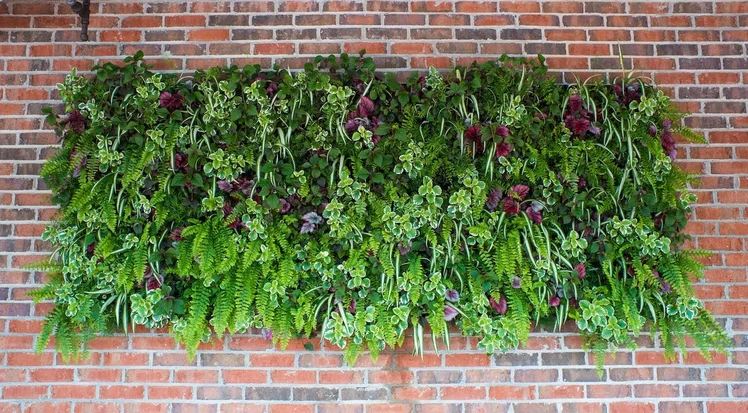
Intrigued? Trust Greenscape, Inc. With Your New Living Wall
Make your property a go-to destination with an innovative “you’ve got to see this” living wall.
We’d love to tell you more.
We’ve been meeting the full-service landscaping needs of commercial and residential customers in the Raleigh, Durham, Chapel Hill and Cary areas for more than 35 years.
We offer landscape management and lawn care, design and build services, irrigation, landscape lighting and more.
Call us at 919-552-7742 or fill out our online form to request a free consultation and learn how we can transform your landscape.
We can’t wait to hear from you.
